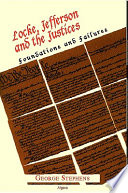 Thirdly, the supreme power cannot take from any man any part of his property without his own consent. For the preservation of property being the end of government, and that for which men enter into society, it necessarily supposes and requires that the... Thirdly, the supreme power cannot take from any man any part of his property without his own consent. For the preservation of property being the end of government, and that for which men enter into society, it necessarily supposes and requires that the...  The Political Register for ... - Página 1851769Visualização completa The Political Register for ... - Página 1851769Visualização completa - Sobre este livro
 | C. F. Forsyth, Ivan Hare - 1998 - 400 páginas
...Two Treatises of Government Locke gave as one of the limitations on supreme legislative power that it 'cannot take from any man any part of his property without his consent'.7 'Hence it is a mistake', Locke said, 'to think that the supreme or legislative power of... | |
 | Cecelia Lynch, Michael Maurice Loriaux - 2000 - 332 páginas
...exercise of public authority. Both strategies can be found in Locke. Thus, he declares that "the supreme power cannot take from any man any part of his property without his own consent." But, when faced with the problems of holdouts and the need to procure public goods by means... | |
 | Brad R. Roth - 1999 - 476 páginas
...Lockean perspective, redistribution is in tension with the state's fundamental purposes: [T]he supreme power cannot take from any man any part of his property without his consent. For the preservation of property being the end of government, and that for which men enter... | |
 | Marie Battiste - 2011 - 345 páginas
...sovereign with limited powers was the source of governmental authority. "The Supreme Power," Locke wrote, "cannot take from any Man any part of his Property without his own consent ... it is a mistake to think, that the Supreme Legislative Power of any Commonwealth, can do... | |
 | Gerald E. Frug - 2001 - 267 páginas
...be protected to ensure the liberty of all Englishmen. This argument anticipated Locke: [T]he supreme power cannot take from any man any part of his property without his own consent. For the preservation of property being the end of government, and that for which men enter... | |
 | Jan Narveson - 2002 - 336 páginas
...effectively almost nothing else is, either. John Locke, it will be recalled, proclaimed that The Supreme Power cannot take from any Man any part of his Property without his own consent. For the preservation of Property being the end of Government ... it necessarily supposes and... | |
 | Ross Harrison - 2003 - 292 páginas
...consent, he particularly stresses the importance of consent where taxation is involved. The supreme power cannot take from any man any part of his property without his own consent', he says [Sec. 138], adding two sections later that 'if any one shall claim a power to lay... | |
 | Frederick Lee Morton - 2002 - 673 páginas
...and by such measures, as they would not have known, and own not willingly. . . . Thirdly, The Supream Power cannot take from any Man any part of his Property without his own consent. ... . . . Fourthly, The Legislative cannot transfer the Power of Making Laws to any other... | |
 | George M. Stephens - 2002 - 224 páginas
...estates, which I call by the general name 'property'." He said that the supreme power (the legislative) cannot take from any man any part of his property without his consent (the preservation of property being the end of government and that for which men enter into... | |
 | John Locke, David Wootton - 2003 - 492 páginas
...and by such measures, as they would not have known, and own not willingly. 138. Thirdly, the supreme power cannot take from any man any part of his property without his own consent. For the preservation of property being the end of government, and that for which men enter... | |
| |